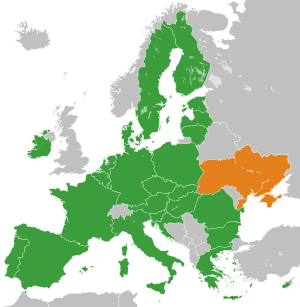The plight of refugees stuck on the outskirts of the EU is not just an issue confined to the southern Mediterranean. A new JRS report shows that asylum seekers in Ukraine are left to their own devices in a country that cannot provide the protection they need.
The current crisis in the southern Mediterranean, which has witnessed tens of thousands of refugees fleeing to the EU from war-torn Libya, has revealed how important it is for the EU to help it's neighbouring countries to provide humanitarian protection. Ukraine is at the doorstep of Europe, sharing large borders with Poland and Romania. An existing readmission agreement allows these and other EU countries to return any migrant to Ukraine.
According to JRS Europe assistant director Luigi Romano, the potential for human rights abuse is real:
“Readmission at the EU-Ukraine border is cloaked in a veil of mystery. It is unknown whether people are truly able to apply for asylum in Europe, or if they are just sent back without any assessment.”The report shows that the EU is also complicit. Policymaking toward Ukraine stresses border security and repelling irregular migration at the expense of protection. The EU has provided Ukraine with funding without really determining its ability to provide protection – throwing money at the country instead of addressing the problem in full. “The EU cannot use Ukraine as a shield against migration,” says Luigi Romano, “If the EU wants to help Ukraine improve its asylum systems, then they have to provide economic and technical support, as well proper monitoring and evaluation.”
Refugees are left in Ukraine despite not even wanting to be there. Many are unable to return to their country for fear of persecution, blocked from seeking asylum in the EU by means of detention. JRS interviewed a detained woman in her sixth month of pregnancy. “There was little respect for women in the centre,” she said. Her husband, detained in a separate cell, added, “The director demanded that she stop crying all the time. When she didn’t, she was punished by spending three days in solitary confinement.”
In Ukraine, only 5.459 people have been granted refugee status since 1993. Until recently, three separate ministries oversaw asylum and migration policy, making it a very complex system for anyone to navigate. Ukrainian NGOs revealed that they are making decisions that the ministries should make, since there is not a coherent government policy.
Ukraine is a country still early in its democratic development. Living standards are very low and corruption is rife in the political sphere. “One of the main problems for refugees is that the country lacks clear asylum laws and is barely able to look after its own people, let alone foreigners'', says David Nazar, director of JRS Ukraine.
The report, No Other Option: Testimonies from Asylum Seekers Living in Ukraine, is based on face-to-face interviews with asylum seekers, Ukrainian authorities and civil society organisations in Lviv.









 Join our page
Join our page


0 comments:
Post a Comment